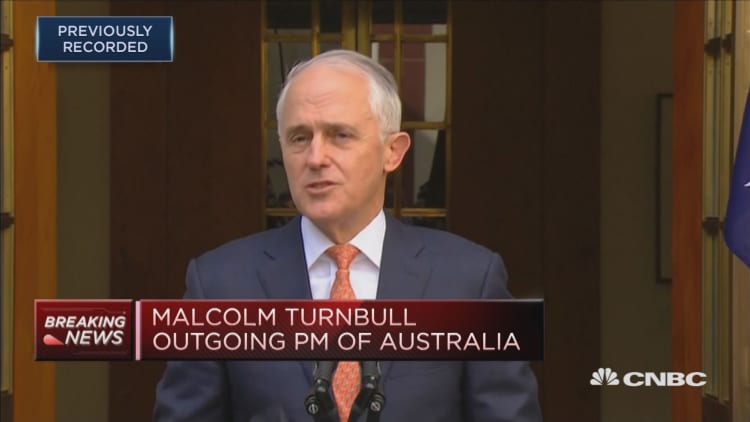Australian Treasurer Scott Morrison is set to be the country's next prime minister, after incumbent Malcolm Turnbull was ousted on Friday.
It came after Morrison won a three-way battle for the Liberal Party leadership. Other contenders included former Home Affairs Minister Peter Dutton and Foreign Minister Julie Bishop. Morrison won 45 votes to 40 at the leadership meeting, according to local media.
Turnbull did not contest for the vote after it became clear that he had lost the support of majority of his party members.
Speaking to the media after being ousted, Turnbull spoke about the incidents that led to Morrison becoming the new prime minister.
"There was a determined insurgency from a number of people both in the party room and backed by powerful voices in the media ... to, if not bring down the government, certainly bring down my prime ministership," Turnbull said at a press conference.
He had narrowly survived a party leadership challenge against Dutton in a vote earlier this week. Since then, several senior ministers who supported Turnbull changed sides. The Liberal Party is a part of the ruling Liberal-National coalition government.
Faced with intense pressure to call for a second vote, Turnbull on Friday convened a party meeting after receiving a letter calling for a new leader that was signed by majority of the party members. He had previously said he would resign from parliament if he was ousted. That could potentially trigger a by-election ahead of the next federal election that needs to be held by the first half of 2019.

Morrison will be the sixth politician to serve as the country's prime minister since 2007.
Energy and Environment Minister Josh Frydenberg was elected the deputy Liberal leader and would take over from Bishop who served as the deputy under both Turnbull and Abbott, the Sydney Morning Herald reported. But Frydenberg will not be the deputy prime minister as that role is currently held by Michael McCormack, who is the leader of the coalition's National Party.
The leadership change is not expected to affect Australia's sovereign credit rating, according to Moody's Investors Service.
"Australia's AAA rating is supported by the country's very high level of economic strength and moderate level of government debt," said Martin Petch, vice president at Moody's Investors Service.
'Revolving door' politics
Commentators said the vote reflected a divide between the conservatives and the moderates within the Liberal Party.
"What I find interesting about the vote is that it is not dissimilar to the proportional outcome in the battle between Mr. Dutton and Mr. Turnbull a couple of days ago," Nicholas Economou, a senior lecturer in politics at Monash University, told CNBC's "Street Signs" after Morrison's win.
"In fact, it's not dissimilar to the proportional breakdown in the Liberal Party Room some years ago when Mr. Turnbull overturned Tony Abbott," he said.
Mark Triffitt, a lecturer of public policy at the University of Melbourne, told CNBC before the vote took place that there is a lot of emotion and anger within the party.
"There's a huge division between the conservatives and the moderates and this thing played out through this process at the moment," he said, referring to the leadership challenge, and explained that Turnbull, as prime minister, was caught up in the split between the moderates and the conservatives.
"We are heading now into uncharted territory in terms of how prime ministers are chosen in Australia. It's a revolving door," he told CNBC's "The Rundown."
Economou explained that Morrison is a lot more conservative than his predecessor and his win suggested the party's decision to "go with someone from New South Wales." New South Wales is Australia's largest state and has the most number of seats in the federal parliament, he said.
"It's an interesting transition, if you will, from a sort of moderate-leadership made up of Turnbull and former deputy and foreign minister Julie Bishop … and we now have a more conservative leadership," Economou said.
— Reuters contributed to this report.


